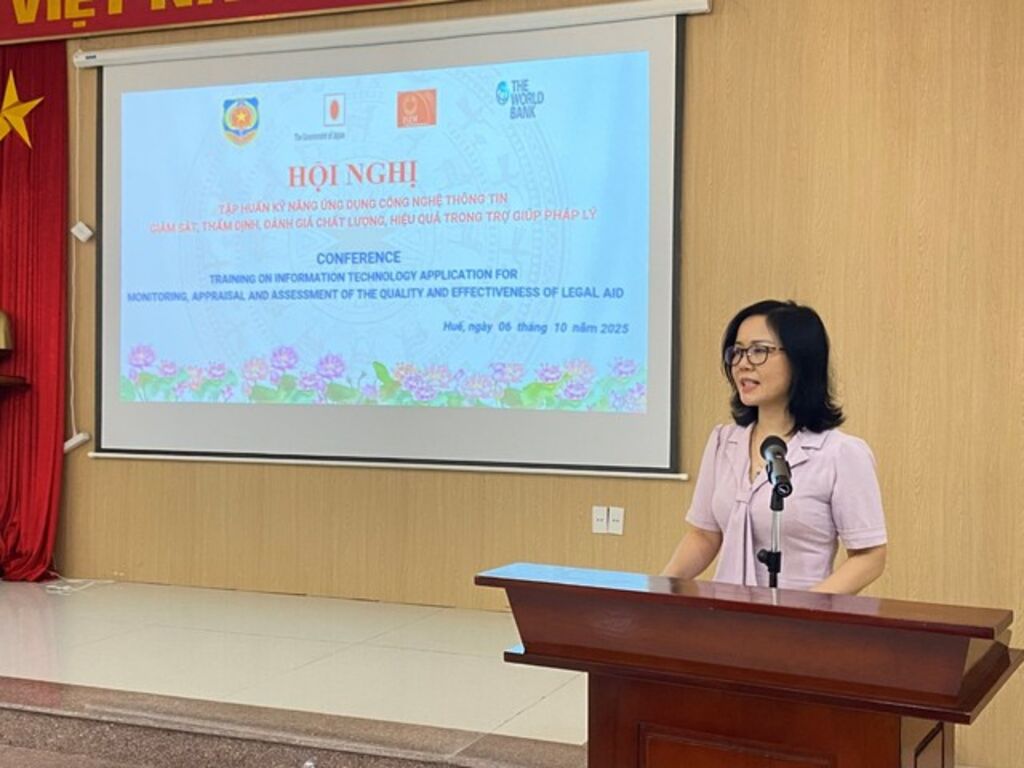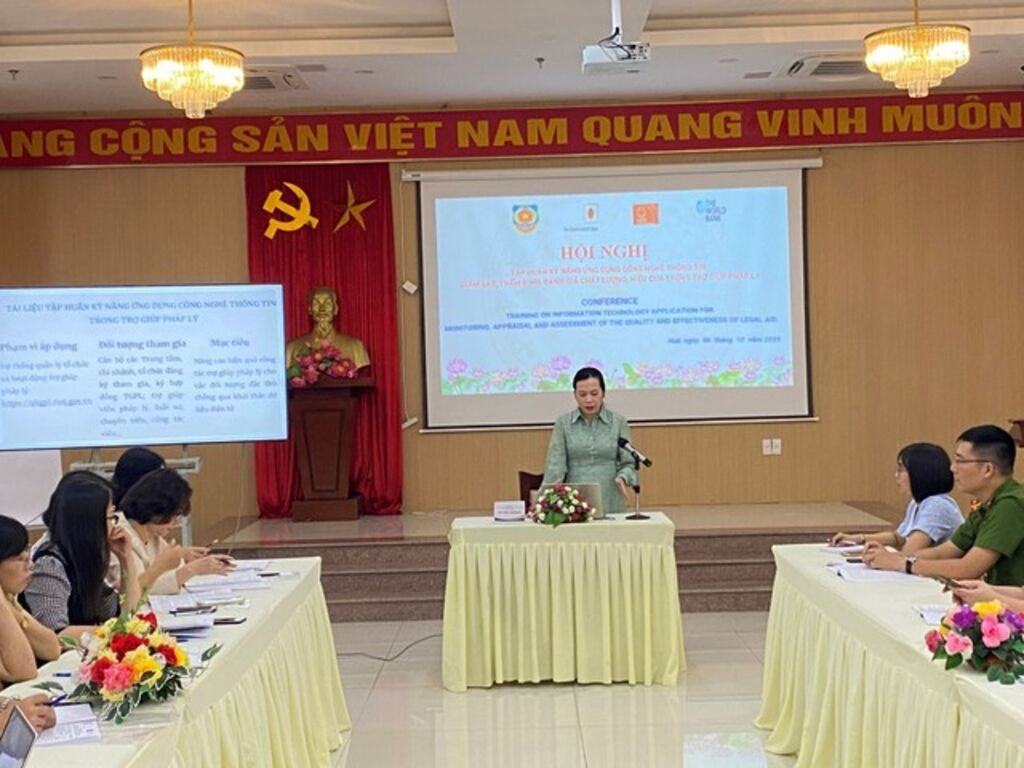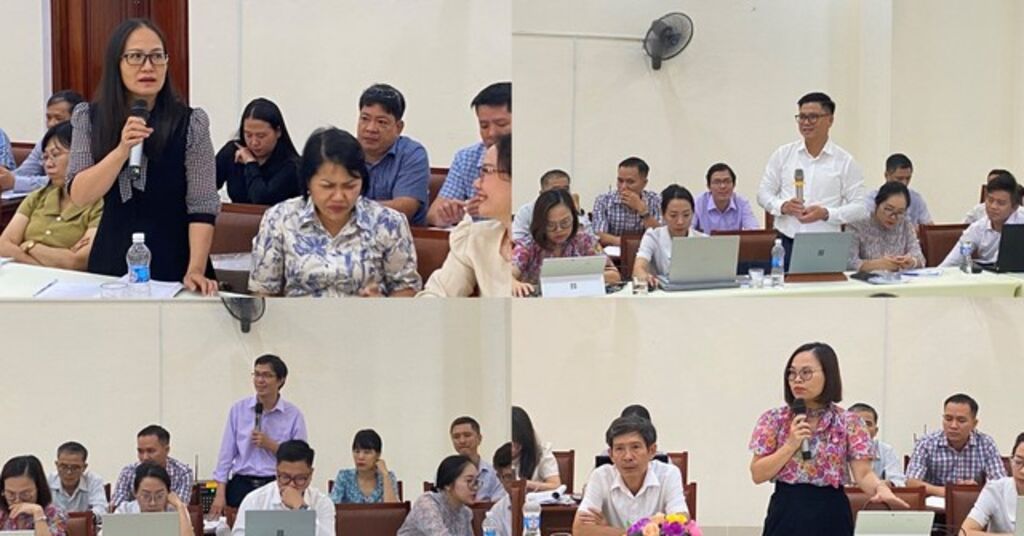 |
| Vu Thi Huong, Deputy Director of the Department of Law Dissemination and Education and Legal Aid, the Ministry of Justice, speaks at the conference__Photo: Department of Law Dissemination and Education and Legal Aid |
A training conference on the application of information technology (IT) in monitoring, appraisal, and evaluation of legal aid services was held on October 6, 2025, in Hue City, as part of the World Bank–funded project “Enhancing Legal Aid for the Poor and Vulnerable Groups,” supported by the Japan Social Development Fund.
The event, organized by the Department of Law Dissemination and Education and Legal Aid under the Ministry of Justice, brought together leaders and officials from provincial legal aid centers nationwide. It marked a new step toward the digitalization of Vietnam’s legal aid system in line with national policies on e-government and digital transformation.
Chaired by Vu Thi Huong, Deputy Director of the Department of Law Dissemination and Education and Legal Aid, the conference drew the participation of Nguyen Thi Xuan Nhi, Deputy Director of the Hue City Department of Justice; representatives of the Hue City Public Security Department; the Project Management Unit of the Ministry of Justice; and officials from legal aid centers in Hanoi, Dien Bien, Lao Cai, Da Nang, Hue, Nghe An, Ha Tinh, Gia Lai, Quang Ngai, Dak Lak, and Lam Dong.
In her opening remarks, Deputy Director Huong emphasized that the development and utilization of electronic legal aid case files and legal aid databases are prescribed in Clause 3, Article 39 of the 2017 Law on Legal Aid. Since 2019, the Ministry of Justice has built and deployed the Management System for Legal Aid Organizations and Activities (the System), which enables legal aid centers and participating organizations to record case data, update staff information, and connect with other state databases.
Notably, the System has begun integrating with the National Population Database under the Prime Minister’s Decision No. 06/QD-TTg dated January 6, 2022, approving the Scheme on Developing Applications of Population, Identification, and Electronic Authentication Data for National Digital Transformation for 2022–2025, with a Vision toward 2030.
She noted that these efforts are consistent with the Party Central Committee’s Resolution No. 27-NQ/TW on continuing to build and improve the socialist law-governed state, which calls for “modernizing and enhancing IT application within the legal aid system.” Similarly, the Politburo’s Resolution No. 66-NQ/TW, dated April 30, 2025, on reforming lawmaking and law enforcement, stresses the need to “promote digital technology and synchronized digital transformation in legal dissemination, education, and legal aid.”
“Enhancing IT application is essential not only to fulfill the Party’s strategic directions but also to improve the effectiveness of state management in the field of legal aid,” Huong said. She urged participants to make full use of the training opportunity, actively exchange ideas, and share practical challenges encountered during implementation, especially under the new local government model.
Toward a fully digital legal aid ecosystem
The technical session was delivered by Do Thi Hao, Deputy Head of the Digital Transformation Division under the Ministry of Justice’s Department of Information Technology, who has been directly involved in the System’s design and development.
 |
| Do Thi Hao, Deputy Head of the Digital Transformation Division under the Ministry of Justice’s Department of Information Technology at the conference__Photo: Department of Law Dissemination and Education and Legal Aid |
Her presentation covered key topics such as the creation and digitization of legal aid case files within the System; data extraction and analysis from the System; the formulation of electronic legal aid case files under the new local government model; and the use of IT tools for monitoring and assessing the quality of legal aid case settlements.
Participants engaged in hands-on exercises guided by the technical team from the Department of Law Dissemination and Education and Legal Aid. They practiced data input, digital auditing, and troubleshooting system issues. In particular, they received clarifications and explanations from the lecturer on unclear issues, as well as difficulties and obstacles encountered during the deployment of the System and in the process of providing legal aid, especially in the context of the merger of provinces and cities under the new local government model.
Many attendees raised operational challenges, including slow processing speeds during reporting periods, incomplete traceability of appraisal and evaluation processes, data migration difficulties resulting from the reorganization of legal aid centers, and inconsistent reporting formats.
These discussions provided practical feedback for improving the System’s functionality. Hao encouraged local centers to continue updating their databases, standardizing records, and promptly reporting technical problems.
 |
| Delegates contribute their ideas at the conference__Photo: Department of Law Dissemination and Education and Legal Aid |
Delegates also contributed ideas to the forthcoming “Legal Aid Information System” Project, now being prepared for nationwide rollout. The project aims to establish a comprehensive digital ecosystem for legal aid, integrating data from justice departments and related agencies while ensuring secure, seamless processing of legal aid procedures online. Administrative procedures are expected to be handled entirely on digital platforms, with results returned through the VNeID application—a significant step toward paperless legal aid services.
By the conclusion of the training, participants had strengthened their capacity to apply IT in supervising, appraising, and evaluating legal aid performance. The event reaffirmed the Ministry of Justice’s commitment to coupling institutional reform with technological innovation—two pillars essential to modernizing Vietnam’s legal aid system and ensuring that vulnerable citizens can access justice efficiently in the digital era.
As Vietnam advances its digital transformation agenda, initiatives like this training session not only enhance professional capacity but also reflect a broader vision of an inclusive, citizen-centered legal aid system, where technology serves as a bridge connecting the law to the people.- (VLLF)









